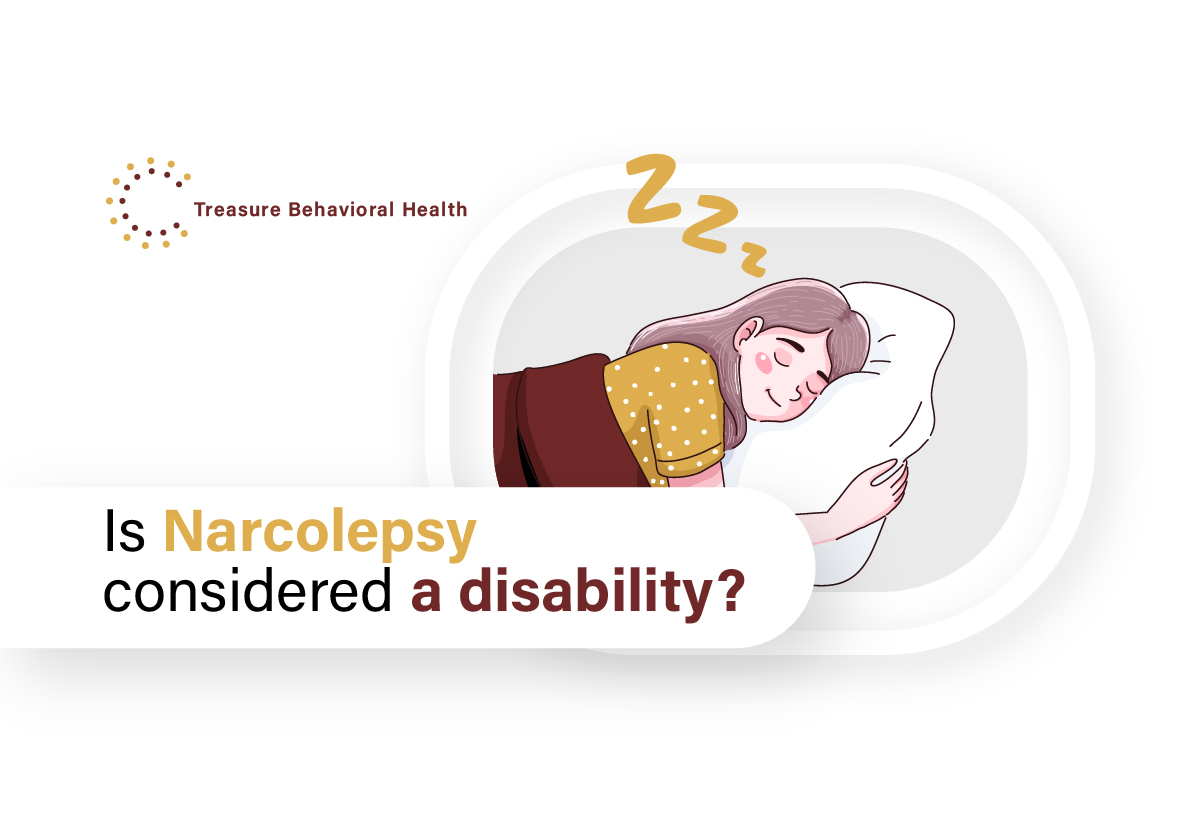Is narcolepsy a disability? If yes, let’s find out about it together and find the facts.
A disability is defined as any illness that affects your capacity to do your job or other daily actions.
Many people think and are curious about whether is narcolepsy considered a disability. Continue reading to collect helpful information and gain insights.
Furthermore, it is a chronic neurological disorder that disturbs the body’s sleep-wake cycle. Its signs can vary from person to person.
Do you want a happy and healthier life without any worries? Indeed, everyone wants to own it.
So, you may rely on Treasure Behavioural Health. We are at your back and can assist you with health concerns!
Is Narcolepsy A Disability?

In some cases, narcolepsy qualifies as a disability.
The severe daytime sleepiness and abrupt loss of muscle control associated with narcolepsy can make working difficult. Some people fall asleep unexpectedly during the day.
These symptoms make specific jobs, such as driving or operating heavy machinery, hazardous.
People with disabilities that limit their capacity to work can avail of the Social Security disability benefits.
The most common signs of narcolepsy comprise:
- extreme daytime sleepiness
- cataplexy
- sleep paralysis
- hallucinations
Need some professional help? We are here for you; contact us!
Autism And Narcolepsy
Discussion The descriptive study of this sample revealed that 40% of children with narcolepsy also have an ASD diagnosis or autistic characteristics.
These children were more likely to be considered anxious by their parents, and they required additional support throughout school.
Anyone who suffers from sleep disorders knows how difficult it can be.
As a result, people with autism spectrum disorder, also known as ASD, may experience more difficulty sleeping.
Narcolepsy A Disability
Is narcolepsy a disability? To some extent, it is considered a disability.
Narcolepsy is a legally recognized disability under the Americans with Disabilities Act (ADA).
This law requires your employer to make reasonable accommodations.
Allowing you to adjust your routine or take brief rest breaks can help you deal with your narcolepsy symptoms.
However, narcolepsy is frequently mistaken as a psychiatric disorder.
What Sleep Disorders Qualify for Disability
Insomnia is considered a disability that is a kind of sleep disorder.
Insomnia on its own is rarely considered a disability by medical professionals. This is because it is typically a symptom of another condition rather than the condition itself.
In addition, insomnia may not be a disability for narcolepsy, but the underlying cause may be.
Mental illness conditions account for roughly 50% or half of all insomnia cases.
Are you searching for the best narcolepsy neurologist near me? You can reach out to us at Treasure Behavioral Health!
Narcolepsy And Sleep Apnea
Narcolepsy and sleep apnea are two various sleep disorders marked by excessive daytime sleepiness.
The symptoms of the two conditions differ significantly. Narcolepsy is defined by sudden sleep attacks that can happen at any time.
Likewise, sleep apnea is characterized by irregular breathing while sleeping.
It is critical to see a doctor if you suspect you have either condition. A doctor can help you reduce your risk of complications.
Is narcolepsy considered a disability– facts about it
You might think about: Is narcolepsy considered a disability? Let’s find out!
The ADA recognizes and protects narcolepsy as a disability. This means that employers must make reasonable accommodations to assist you in performing your job duties.
Narcolepsy can sometimes qualify you for Social Security benefits.
There are a few signs that you can examine in yourself to whether you have narcolepsy or something else.
- Avoiding eye contact.
- Having difficulty recognizing or understanding their feelings or those of others.
- Avoiding physical contact or allowing it only under certain conditions.
- Individuals who prefer solitude may appear uninterested in surroundings or objects of interest to others.
- Difficulty claiming or playing other games requiring imagination.
Is Hypersomnia A Disability?
Yes, hypersomnia is considered a disability. It affects the person’s ability to work and focus on the work. Such individuals are also unable to concentrate on their daily lives and isolate themselves from others.
You might wonder: Is excessive daytime sleepiness considered a disability? Is narcolepsy considered a disability? The answer is yes, as it is regarded as a disability but not called the time. It depends on the situation and the condition of the patient.
However, symptoms such as excessive daytime sleepiness and sudden loss of muscle control can make working with narcolepsy difficult.
This can limit a person’s ability to work so that they may be eligible for Social Security disability benefits.
Tips To Apply for Disability Benefits
Is narcolepsy a disability? If yes, you can apply for disability benefits.
The sooner you file for disability benefits, the better. The Social Security Administration can take 3 to 5 months to process your claim.
Before you apply, ensure that you have all of the medical information required by the Social Security Administration. This includes:
- Please provide your diagnosis, starting date, and the tests used by your doctor, such as ERGs, lab tests, and sleep studies.
- Your symptoms and how frequently you experience them
- A list of your medications and how they impact your symptoms.
- A letter from your doctor saying how narcolepsy symptoms affect your ability to work, including strolling, lifting, sitting, and remembering instructions.
In a Nutshell
Is narcolepsy considered a disability? Yes, to some circumstances living with narcolepsy can be difficult for many reasons.
Excessive sleepiness, sudden muscle weakness, and unpredictable bouts of daytime sleeping can all complicate daily tasks.
Nevertheless, if you have narcolepsy or are caring for a loved one who has the condition, there are numerous legal resources available to help you.
The ADA recognizes and protects narcolepsy as a disability. This means that employers must make reasonable accommodations to assist you in performing your job duties.
At Treasure Behavioural Health, Dr. Roberta Iyamu talks with you and asks you about the mental conditions you are facing. Afterward, she’ll give you the best suggestion and best option for treatment.
Frequently Asked Questions
Do people with narcolepsy qualify for disability?
Your narcolepsy may qualify for disability benefits if you can demonstrate to the SSA that it prevents you from working and will keep you out of work for at least one year.
Can you live a full life with narcolepsy?
The best thing is that narcolepsy is an achievable condition, and almost everyone with it can live a fulfilling life.
Do narcoleptics have a shorter lifespan?
The study, published in the March issue of sleep, is the first to identify increased mortality in narcolepsy. According to the findings, narcolepsy is associated with a 1.5-fold increase in relative mortality.
Can narcolepsy go away?
Narcolepsy is a lifelong condition that does not typically worsen as the person ages. Symptoms can improve gradually over time, but they will never go away completely.



No comment